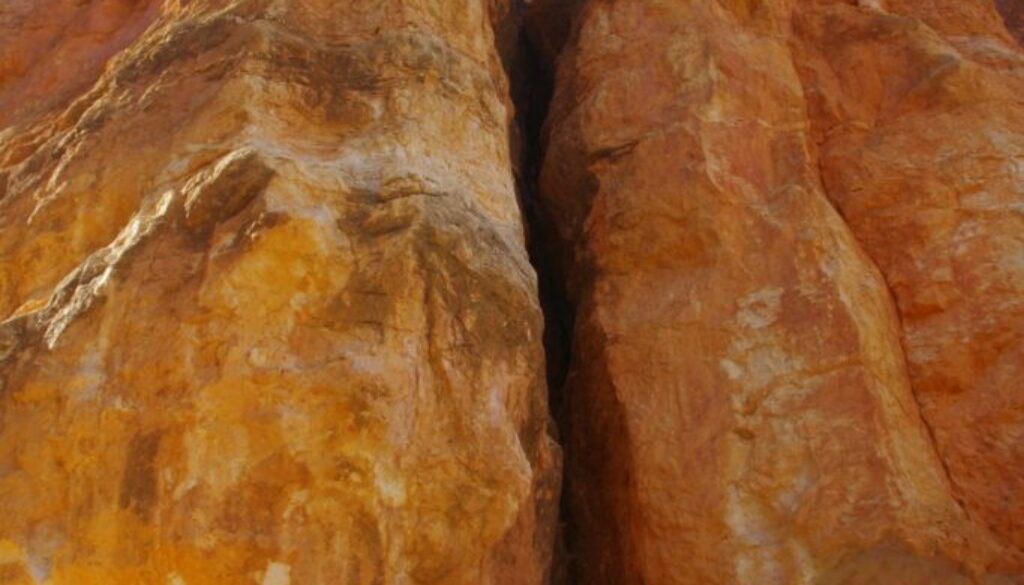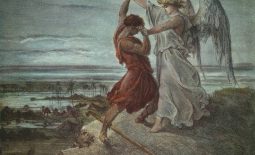The Cleft of the Rock
By the time I am giving this sermon, our Sedarim will have ended. Still, right now, I am seated at my dining room table, the scents of chicken soup wafting through the kitchen door. Pesach is coming and I do not feel remotely prepared. I prepared as best as I could—kashering the essentials, sorting out and isolating chametz, cooking and cleaning—and still it did not feel enough. Unlike previous years, I have felt little joy and anticipation this Passover. It has felt strange and ominous.
This will not be and has not been a perfect Passover.
As the Rabbi of this community, I have exhorted all of us to extend ourselves grace. We might not be able to procure the Kosher-for-Passover foods that we need. We might feel emotionally distracted and physically exhausted to prepare in the way we are accustomed.
We should not expose ourselves to contagion and danger in a desire to be meticulous but rather focus on the meaning and relationship of the Festival, to feel softly embraced by the gentleness of Spring. These are strange days. Day in day out, we unpack the political, economic, social and medical ramifications of this pandemic and it weighs heavily on our hearts. My previous three sermons have been devoted to those very topics. Today, I would like to strike a different and more hopeful tone. As in the words of Song of Songs, which we traditionally read during Passover:
“See! The winter is past;
the rains are over and gone.
Flowers appear on the earth;
the season of singing has come,
the cooing of doves
is heard in our land.”(Song of Songs 2:11-12)
The winter is past. How many of us are able to feel that sentiment? It’s been a long winter. Sheltering-in-place during the emergence of Spring is particularly taxing. At a time where we feel an urge to go outdoors with every fiber of our being, we have been called to exercise restraint. Our restraint is a holy discipline, a great mussar (lesson) in our inextricably interconnected global humanity, and an exercise of will, dignity and love. Here we are, four weeks in, adjusting slowly to a ‘new normal’, and finding glimmerings of hope and meaning. Curves are slowly starting to flatten. New insights on how to fight this virus and treat the sick are emerging. A new consciousness is being birthed, both individually and collectively, on what we value in our society and how we should provide for each human being. It is still too early to derive hard and fast conclusions, to say that the danger has abated, but it is early enough to sense a closeness and an intimacy that was overwhelmed by the urgency of the crisis.
Why do we traditionally read a section from Parashat Ki Tissa during Shabbat Chol ha’Mo’ed Pesach? It seems strange that we choose to focus on verses not directly connected to Pesach. Sure, the latter part of the reading makes sense: it is a summary of the Torah’s commandments to celebrate the ‘shalosh regalim’, the Pilgrim’s Festivals. But the first half of the reading feels less obvious. It recounts the ‘chet ha’egel’, the Sin of the Golden Calf. Why does our traditional luach(lectionary) choose this? The choice has liturgical consequences. If we would have had a Torah service during the Festival instead of a Zoom service, we would have risen to greet the parading of the Torah and sung ‘Adonai, Adonai El Rachum v’Chanun’, ‘Eternal, Eternal, the Compassionate and Merciful God…’ – the core text from Ki Tissa listing the Thirteen Attributes of the Divine. But ultimately, this is a piece of circular reasoning.
Perhaps, it is because this reading allows us to process trauma. The Seder focuses on the glory of our Redemption. It is grand, bold, revolutionary. The Festivals follow in its wake, where we offer thanks and sing praises through Hallel. These are unabashedly happy times for the newly liberated. But what happens next? When a collective has been in survival mode for a long time, have they been given the chance to really process, in their kishkes, what these momentous changes mean? The answer is no. Between the Exodus and the Incident of the Golden Calf (in the wake of Revelation at Mt. Sinai) is a mere seven weeks. After hundreds of years of slavery, what is a mere seven weeks to come to terms with what the Israelites have witnessed? The retrograde idolatry of the Golden Calf comes from a place of deep trauma; it is a familiar groove in the collective psyche, the impulse of a population in despair, even if they have just been set free. It is a window into the human condition and raises questions for us also, about What Happens Afterwards.
One day, we will slowly emerge from our shelters. It will not be a clean break. There may be subsequent waves, although I leave that assessment up to the epidemiologists and public health experts. One day, there will be a vaccine. Still, we will have to contend with what we have lost and more importantly, who we have lost. We will have to grapple with the upheaval in our lives and the devastation our society has suffered. At precisely that moment, the moment of our collective PTSD, the Torah gives us a model of how to move forward. Not be reverting to retrograde patterns of spiritual addiction, but through deep and lasting learning and healing. Through grace, love, forgiveness, vision.
Moses pleads with God to see God’s face. God, being the astute Divine Parent, gives a workable compromise: ‘I will make all My goodness pass before you, and I will proclaim before you the name Adonai, and the grace that I grant and the compassion that I show.’ (Ex. 33:19) God assures that we cannot get everything we yearn to have, but we can be given a vision of love and be shown a path forward. It is not for naught that God has sheltered Moses in the cleft of the rock and passed by Moses, a second set of Ten Commandments are carved out and stored in the Ark of the Covenant alongside the shards of the first, broken set. We carry our pain and brokenness with us; there is no pretending that love can undo the fissures in our souls. But there is a promise of a new beginning, of honouring what we have gone through as a human collective, and coming out on the other side. This is the loftiest of response to the basest of our impulses. This is how love allows us to pivot away from fear.
It is not over yet. The apex has not yet been reached and more accounts of devastation will follow. But there are cracks in the sky that allow the light to flood in. There is a little more oxygen in our lungs, a measure of vision and prophecy that invites us to ream of a better world, of a world transformed. There is, in the cleft of the rock, the shelter of stillness that offers us repose. And as per Song of Songs, in that cleft, we can hear a dove coo. We are still locked in, physically separated. But we can feel the closeness and the solidarity. We can approximate a brush with the Divine and the deep connection to each other.
From Spring emerges a liturgy of intimacy, prayers of hope. This Passover will truly be unique and may we find blessings in it.
“The fig tree forms its early fruit;
the blossoming vines spread their fragrance.
Arise, come, my darling;
my beautiful one, come with me.”




